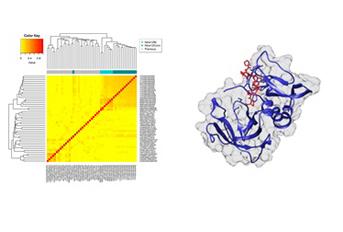Associação Portuguesa de Investigação em Cancro
Novel peptides for individualized therapy of claudin-low breast cancers
Novel peptides for individualized therapy of claudin-low breast cancers

What are the main drawbacks in breast cancer early detection?
What is the breast cancer subtype with the worst clinical outcome?
Why are novel cellular targets important for targeted therapies?
Triple negative breast cancer is a malignant breast cancer subtype, characterized by the lack of known specific biomarkers. It has a negative prognosis and is highly metastatic, due to its inability to respond to known classical hormonal therapies. It has become a hot topic, due to the unmet need in identifying new cellular targets, that may be used in early diagnosis or novel targeted therapies. Due to high tumor heterogeneity it is important to identify and isolate new biomarkers, which can promote the development of new personalized therapies.
At the University of Minho, a research study focused on exploiting phage display as a means to identify and isolate new peptides for the MDA-MB-231 cell line, which is representative of triple negative breast carcinomas. The methodology used aided by a rigorous bioinformatics analysis, allowed the identification of two new peptides (PRWAVSP e DTFNSFGRVRIE), that exhibited strong binding to the MDA-MB-231. They also showed good specificity, as demonstrated by the low binding to the control MDA-MB-435 cells. This data can be very useful to predict the potential new cell targets (biomarkers), using phage display and to isolate peptides that are specific for the desired targeted cells. Such peptides can be a valuable contribute towards future clinical applications through the development of more specific and targeted therapeutic solutions against triple negative breast cancer subtype.
Authors and Affiliations:
Franklin L. Nobrega, Débora Ferreira, Ivone M. Martins, Maria Suarez-Diez, Joana Azeredo, Leon D. Kluskens and Lígia R. Rodrigues
Centre of Biological Engineering (CEB), University of Minho
Laboratory of Systems and Synthetic Biology, Wageningen University and Research Centre
Abstract:
Background: Claudin-low breast carcinoma represents 19% of all breast cancer cases and is characterized by an aggressive progression with metastatic nature and high rates of relapse. Due to a lack of known specific molecular biomarkers for this breast cancer subtype, there are no targeted therapies available, which results in the worst prognosis of all breast cancer subtypes. Hence, the identification of novel biomarkers for this type of breast cancer is highly relevant for an early diagnosis. Additionally, claudin-low breast carcinoma peptide ligands can be used to design powerful drug delivery systems that specifically target this type of breast cancer.
Methods: In this work, we propose the identification of peptides for the specific recognition of MDA-MB-231, a cell line representative of claudin-low breast cancers, using phage display (both conventional panning and BRASIL). Binding assays, such as phage forming units and ELISA, were performed to select the most interesting peptides (i.e., specific to the target cells) and bioinformatics approaches were applied to putatively identify the biomarkers to which these peptides bind.
Results: Two peptides were selected using this methodology specifically targeting MDA-MB-231 cells, as demonstrated by a 4 to 9 log higher affinity as compared to control cells. The use of bioinformatics approaches provided relevant insights into possible cell surface targets for each peptide identified.
Conclusions: The peptides herein identified may contribute to an earlier detection of claudin-low breast carcinomas and possibly to develop more individualized therapies.
Journal: BMC Cancer
Link: https://bmccancer.biomedcentral.com/articles/10.1186/s12885-016-2937-2




